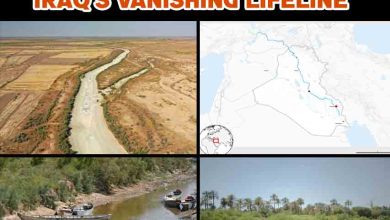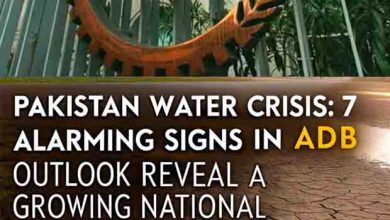Can Pakistan Survive Its Growing Water Crisis? | A Wake-Up Call for Water Sustainability
Can Pakistan survive its growing water crisis? With no sustainable national water mechanism in place, the country is inching toward disaster.
Imagine waking up to dry taps, empty tanks, and no water to drink. It’s not a distant sci-fi plot — it’s an emerging national emergency. Pakistan’s water crisis is not theoretical. It is urgent, visible, and measurable. Experts warn that groundwater levels are falling by over 1 meter annually, with no national mechanism to conserve or manage this vital resource.
Pakistan’s Water Crisis: The Warning Signs
Rainfall Scarcity and Wastage
Pakistan has witnessed 41% below-average rainfall in the last six months of 2024, but no systems were in place to capture and store it. Rainwater is often allowed to drain into sewers and then into the sea.
Key Facts:
-
Groundwater is depleting fast in urban zones like Lahore and Islamabad.
-
Tarbela and Mangla Dams are near dead levels due to sedimentation and poor maintenance.
-
Karachi, with under 7 inches of rainfall annually, lacks a functional rainwater harvesting network.
-
Even Islamabad, receiving over 31 inches of rainfall, struggles with seasonal water shortages.
Dwindling Rivers and Poor Irrigation
The mighty Indus, Ravi, Sutlej, and Jhelum rivers are drying. Climate change, political disputes, and decades of mismanagement have starved them. The irrigation system remains outdated, with 50% water lost due to seepage and inefficiency.
Crippling Infrastructure and Mismanagement
Focus on Infrastructure, Not Essentials
Pakistan continues to build malls and highways while ignoring basic utilities like water sustainability. The lack of investment in small dams, rainwater systems, and treatment plants has brought the nation to the brink.
Lack of Execution
Pakistan has a National Water Policy, but it’s mostly paper-bound. Implementation is missing due to:
-
Lack of political will
-
Weak funding
-
Underperforming departments like WAPDA and provincial Irrigation Authorities
Inter-Provincial Water Disputes
The Cholistan Controversy
A recent plan to allocate water to six canals for Cholistan sparked tensions between Punjab and Sindh. Punjab defends the move as part of state-supported agriculture. Sindh argues it violates the Indus Waters Accord of 1991, worsening the crisis in the lower riparian province.
Key Concerns from Sindh:
-
Agricultural impact due to further shortages
-
Drinking water depletion
-
Ecological imbalance
Urgent Need:
A revised, enforceable inter-provincial water governance framework is essential to prevent conflict and ensure equity.
Solutions Already Working in Small Communities
In Karan, Cholistan, residents have taken matters into their own hands. They build rainwater-harvesting tanks, irrigate small crops, and even recharge underground wells — without government support.
Lessons from Karan:
-
Change can begin with individuals and communities
-
Mega-dams are not the only solution
-
Grassroots resilience offers hope for national strategies
What Needs to Be Done: A National Action Plan
1. Urban Rainwater Harvesting
-
Make rooftop rainwater systems mandatory
-
Offer subsidies or tax rebates to homeowners and builders
-
Cities like Lahore, Karachi, and Islamabad must invest in localized storage
2. Build Small and Medium Dams
-
Cost-effective
-
Faster to build
-
Ideal for rural and mountainous regions
3. Wastewater Treatment and Reuse
-
Promote greywater recycling for gardening and flushing
-
Encourage industrial water reuse systems
4. Groundwater Recharge
-
Install recharge wells in urban centers
-
Monitor extraction through smart meters and regulations
5. Smart Agriculture Practices
-
Use drip irrigation and laser land leveling
-
Shift to drought-resistant crops
-
Educate farmers through extension programs
6. Policy Execution with Accountability
-
Set timelines and measurable outcomes for the National Water Policy
-
Empower WAPDA with autonomy, skilled manpower, and modern tools
-
Launch a “Water Literacy” movement in schools and public spaces
Conclusion: A Future Still Within Reach
Pakistan’s water crisis is daunting but not irreversible. With collective will, political commitment, and public engagement, the nation can avoid a future where water becomes a luxury. Let this crisis not be remembered as the beginning of national decline, but as the turning point toward resilience.
Water is not just a resource — it is the foundation of life. If small desert communities like Karan can lead the way, so can we as a nation.







